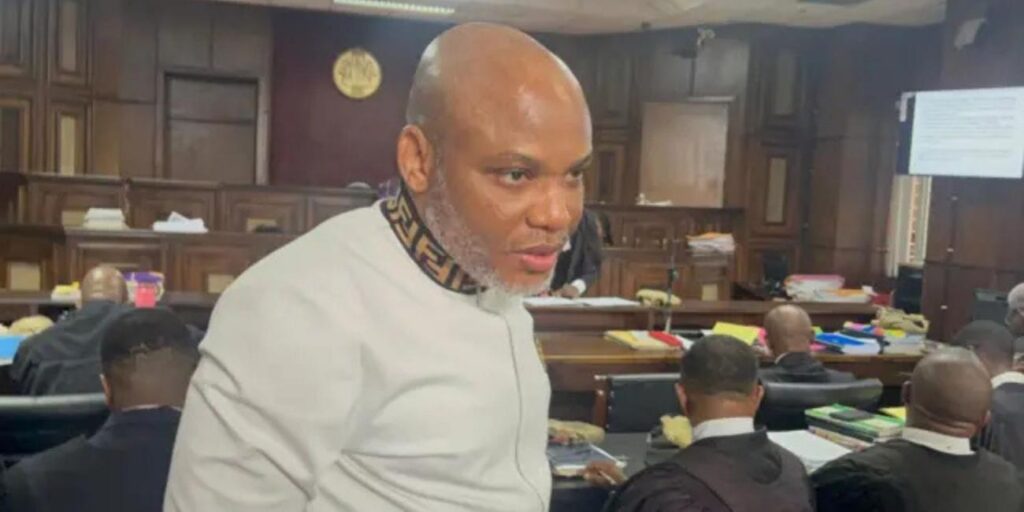
A legal consultant to the detained leader of the Indigenous People of Biafra (IPOB), Mazi Nnamdi Kanu, Barrister Jude Njoku, has sharply criticized the Supreme Court of Nigeria over its December 15, 2023 decision remitting Kanu’s case to the Federal High Court, describing the judgment as “unlawful, void, and constitutionally heretical.”
In a detailed critique titled “A Devastating Critique: The Nigerian Supreme Court’s Unlawful Remittal of Nnamdi Kanu’s Case, the Inviolability of Section 36(9) Immunity, and the Universal Doctrine of Finality of Appellate Discharge,” Njoku, who serves as consultant to the Nnamdi Kanu Global Defence Consortium, accused the apex court of committing what he called “a blatant constitutional perversity” that undermines both the rule of law and the supremacy of the Nigerian Constitution.
According to him, the Supreme Court acted “without jurisdiction” by remitting a case that had already been terminated by the Court of Appeal’s October 13, 2022 judgment, which discharged Kanu of all charges.
“While it is accepted that the law is what the Supreme Court says it is in the interpretive hierarchy, this maxim yields inexorably to the supremacy of the Constitution under Sections 1(1) and 1(3). The Constitution is the supreme law — not the Supreme Court,” Njoku stated.
Citing Section 36(9) of the 1999 Constitution (as amended), the lawyer argued that once the Court of Appeal discharged Kanu, he became “constitutionally untouchable for the same offences.” He described that section as conferring non-derogable immunity from further prosecution once a valid discharge has been entered by a competent court.
“The non-derogable immunity conferred by Section 36(9) is self-executing, absolute, and beyond the reach of any judicial organ, including the apex court. Once the Court of Appeal pronounced discharge, jurisdiction to retry him was permanently lost,” he said.
Njoku further faulted the Supreme Court for remitting the case “without reversing the finding of illegal rendition or adducing new evidence,” describing the move as a violation of the Doctrine of Finality of Appellate Discharge — a principle he said is universally recognized in common law jurisdictions such as England, Canada, and Australia.
The legal expert referenced landmark Nigerian cases including FRN v. Ifegwu (2003), Abacha v. Fawehinmi (2000), and Dokubo-Asari v. FRN (2007), maintaining that once an appellate court discharges a defendant, “the matter ends finally and irrevocably.”
He described the Supreme Court’s 2023 ruling as “judicial overreach masquerading as appellate review,” arguing that the decision effectively elevated the court above the Constitution and eroded the doctrine of separation of powers.
“To hold otherwise is to elevate the Supreme Court above the Constitution it swore to uphold and render Section 36(9) a mere suggestion and Section 1(3) a dead letter,” Njoku warned.
The consultant also accused the five-member panel that delivered the December 2023 judgment of committing a “second constitutional abomination” by overturning an established African Charter jurisprudence previously decided by a larger, seven-member constitutional bench.
“No smaller bench can lawfully overrule or modify the decision of a larger constitutional panel. This judicial insubordination to binding precedent undermines institutional coherence and collapses the hierarchical integrity of the Court itself,” he said.
Njoku concluded that the December 15, 2023 remittal judgment was “void ab initio” for want of jurisdiction and amounted to “judicial insurrection” against both the Nigerian Constitution and the African Charter on Human and Peoples’ Rights, which he noted forms part of Nigeria’s supreme law.
“It is therefore beyond question that the remittal judgment is not only void for want of jurisdiction, but also void for judicial insurrection against the Constitution and the African Charter jurisprudence,” he declared.